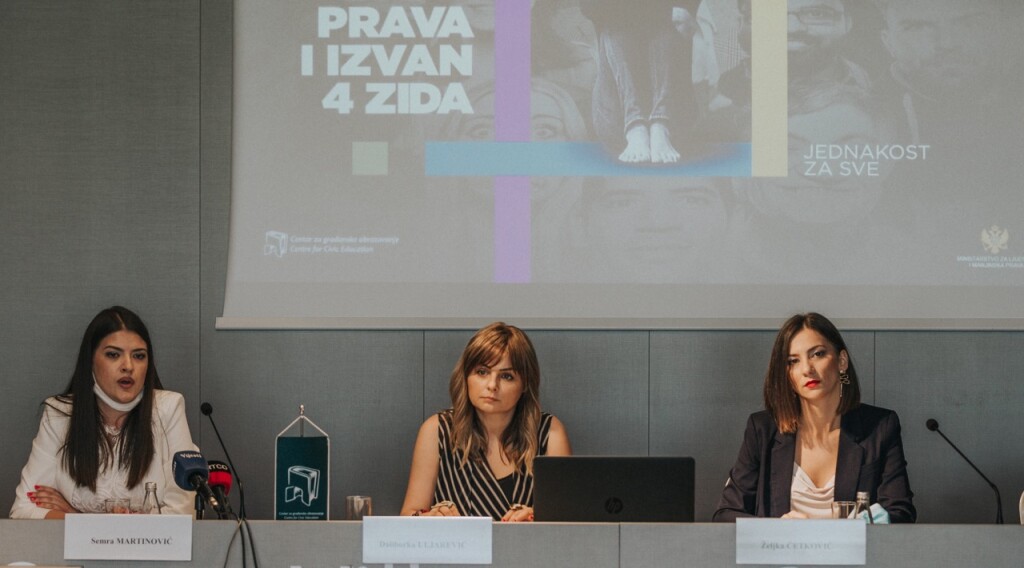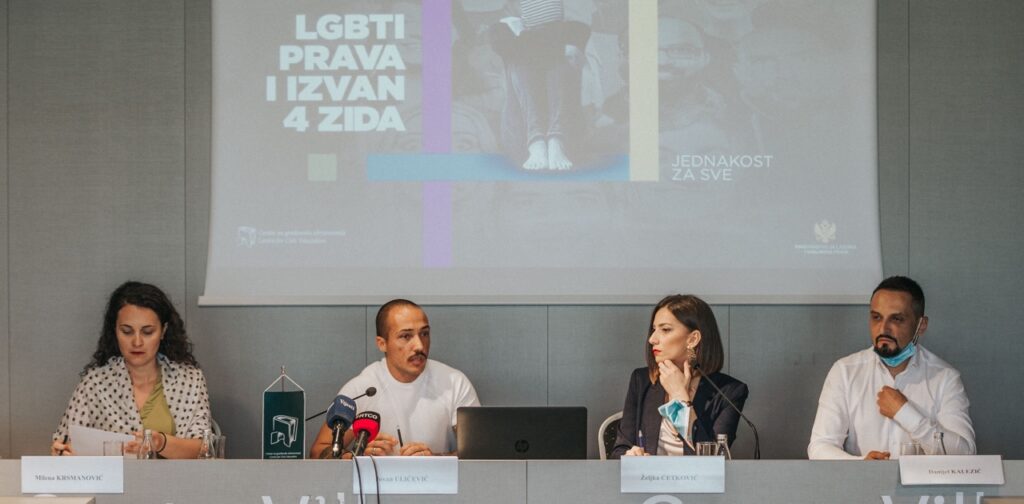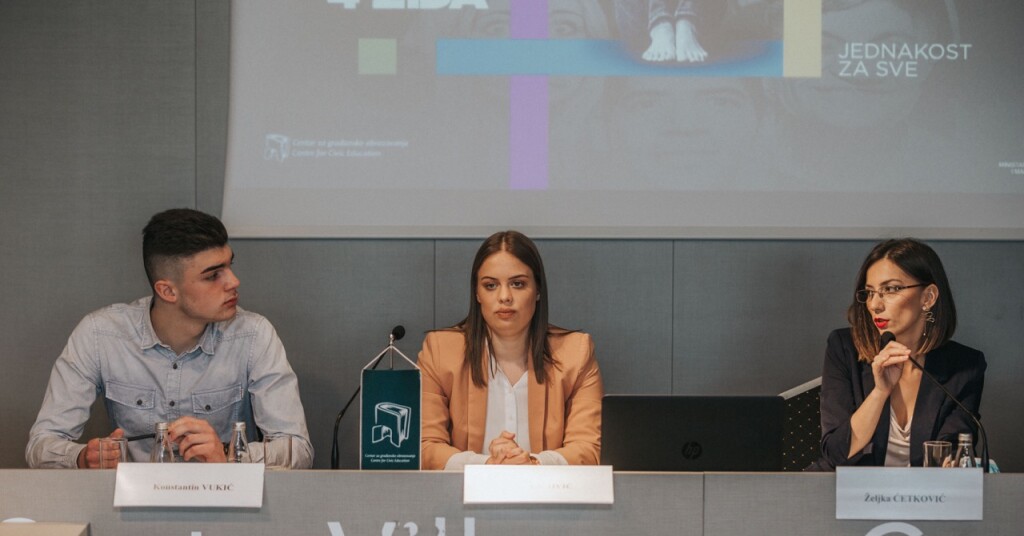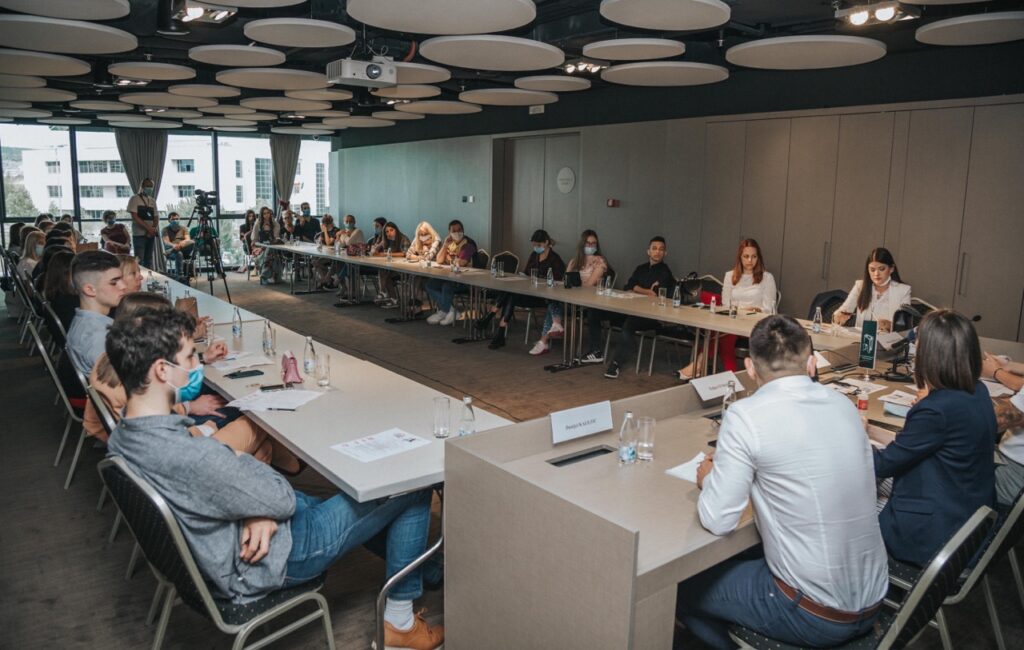Competent institutions and decision-makers should demonstrate the degree of sensibility we witnessed at today’s conference and enable the creation of a climate of full acceptance of LGBTIQ persons in Montenegro, and especially when it comes to harmonizing legislative and institutional dimension of protection of LGBTI rights so that sanctioning human rights violations of LGBTIQ persons would no longer depend on the institutional courage of competent actors but exclusively on facts and legally prescribed protection mechanisms, as it was concluded today at the final conference ‘LGBTI rights beyond 4 walls – EQUALITY for all’.
In the opening remarks, Semra Martinovic, Independent Advisor in the Directorate for Promotion and Protection of Human Rights of the Ministry of Human and Minority Rights, emphasized that young people, as bearers of future social life in Montenegro, represent the target group of particular importance because their education lays the foundations for strengthening social awareness of tolerance and acceptance of diversity. ‘Therefore, the project ‘LGBTI rights beyond 4 walls – EQUALITY for all’ is recognized as a quality contribution to the implementation of the policy of the Government of Montenegro in the field of protection and improvement of the quality of life of LGBTI persons. The central focus of this project is to increase the level of awareness and knowledge of young people about the rights of LGBTI persons, which contributes to breaking the ingrained prejudices towards LGBTI persons within Montenegrin society and deconstructing their stereotypical perceptions,’ said Martinovic. She emphasized that Montenegro is on the way to getting the Law on the life partnership of the same – sex partners, which would complement the Law on Prohibition of Discrimination, as a basis for the protection of human rights of LGBTI persons. ‘However, raising the level of awareness of our citizens about the human rights of LGBTI persons remains a challenge for all of us. Therefore, these projects represent direct operationalization of these needs’, she claimed, adding that this project also contributed to the implementation of guidelines from the Strategy for Improving Quality of Life of LGBT Persons 2019-2023, and consequently the benchmarks from the negation Chapter 23 (Judiciary and fundamental rights).
Daliborka Uljarevic, Executive Director of the CCE, emphasized the importance of education in promoting human rights and lessons learned of the implemented project activities. ‘In the formal education system, the thematic representation of human rights is neither sufficient nor adequate. Moreover, the culture of human rights is not preserved either. On the other hand, the system is not closed, and we believe that there is a readiness for improvements, we identify sensible professors and most importantly, the interest of young people to learn about human rights and to accept differences when these issues are explained to them appropriately,’ she summarized. Uljarevic also reminded that LGBTI persons remain at the top of the list of the most discriminated within Montenegrin society, but also that awareness of the need to discuss and learn about different sexual orientation through well-founded and scientific discourse is developing and that the CCE research indicates that citizens increasingly support the introduction of these issues into the programmes of the political parties. ‘Finally, 55% of our citizens, according to our research from last year, have a positive attitude towards the adoption of Law on the life partnership of the same – sex partners. I think that this obliges all progressive actors in the Parliament of Montenegro, and the degree of their commitment to the implementation of European values and standards will be reflected in this issue as well. I take this opportunity to call on all members of the Parliament of Montenegro to support a discriminated minority in exercising their rights. We who belong to the majority will not have less rights because of that, but for many in that minority, the life will gain the quality and dignity that belongs to them as equal citizens of our society. Those who restrict the right to equality to the LGBTI community deny themselves the legitimacy to fight for the rights of some other groups because there is no selective fight for human rights,’ she concluded.
At the panel Position of LGBTI persons in Montenegro and Current Challenges, Milena Krsmanovic, advisor of the Protector of Human Rights and Freedoms of Montenegro, reflected upon cases of discrimination that de facto arose from stereotypes, prejudices and discriminatory behavior patterns. As an example of the good reaction of the Protector’s institution, she reminded of the case of hate speech expressed in the statements of the priests towards LGBTIQ persons and organizations that stand in their protection, to which the Ombudsman responded by recommending an apology, which is still not addressed to the LGBT community. ‘We believe that the position of LGBTIQ persons in Montenegro will be significantly improved, that they will have access to rights and that they will exercise their rights when the Law on the life partnership of the same – sex partners is adopted. We expect that this law will now get a parliamentary majority, i.e. that in the meantime something has been done to change the parliamentary consciousness. Namely, regardless of all political and ideological differences, human rights are at stake here,’ said Krsmanovic. She pointed out that attacks and hate speech are most often prosecuted in misdemeanor proceedings, where fines or conditional warnings are imposed, while criminal prosecution is missing. ‘It is something that is noticed not only by the domestic but also by the international community, as it can be seen in the European Commission’s Montenegro 2019 Report. Also, ECRI notes that attacks and hate speech are on the rise, especially online, while criminal prosecution lacks and milder sanctions are imposed, which send a clear message that the response to assaults, attacks on people’s lives and safety and hate speech are conditional discharge, a warning, and not yet effective, proportionate and dissuasive sanctions’, concluded Krsmanovic.
Danijel Kalezić, President of Managing Board at Queer Montenegro, stated that from communication in young people, with whom he worked through workshops of the CCE and other NGOs, visible progress is noted, which confirms the 11th place of Montenegro on the ILGA-Europe Rainbow Map. He also claimed that the adoption of the Law on the life partnership of the same – sex partners would improve the position of the LGBTIQ community and contribute to their freedom. ‘Things are much better compared to the time of launching the first activities that were aimed at improving the position of LGBTIQ persons. Today, we have Pride, more LGBT organizations, people who are outed in the media, activism, and strong support of organizations that are not only focused on LGBTIQ rights,’ assessed Kalezic. He emphasized that there are still a lot of outstanding issues. ‘Although we live more freely today, although young people are beginning to gain an understanding of the people around them, we must never forget those who are hidden, those who live in fear faced with violence or frighten that if they talk to someone, they will encounter condemnation and loss of support from family and friends,‘ he reminded. Kalezic pointed out that it is necessary to demonstrate support to LGBTIQ persons in cases of violence and discrimination and to create an environment where everyone can live freely, ‘which requires the adoption of the Law on the life partnership of the same – sex partners, but also institutional courage to adequately prosecute all persons when it comes to homophobia, regardless of whether they are anonymous individuals or representatives of religious and state institutions.‘
Jovan Ulicevic, Executive Director of the Association SPEKTRA, focused on the problem of lack of legal gender recognition. ‘Transition itself is a traumatic experience, further aggravated by situations such as e.g. showing documents that do not reflect your gender identity, gender expression and therefore I emphasize the importance of legal regulation in this area. The majority in the transgender community is neither ready nor willing to go through the sterilization process. Whether we all want it or not, it is important that it is a matter of our choice,‘ he claimed. ‘Speaking about young people, it is very important to mention that the research of the Association SPEKTRA indicated that as many as 50% of young people think that trans people suffer from a mental disorder, that 30% that trans people should not go through the process of gender adjustment, or that 40% of them think that trans people violate tradition and norms. In this regard, it we must talk about youth education. ‘From work and experience based on the ‘living library’ method, through which we can discuss all these issues, we have seen that attitudes acquired through formal education can rapidly change through non-formal education and that understanding and tolerance can be built,’ he stated. Ulicevic emphasized that we still do not talk enough about intersex persons, although there is a prohibition of discrimination based on intersex characteristics in the Law on Prohibition of Discrimination. ‘We still have no data on the number of persons who experience genital correction at birth, nor the data on surgical procedures that are medically indicated, or surgery that affects the functioning of organic systems – we are talking exclusively about aesthetic corrections‘ he stated. Ulicevic concluded that many issues that are essential and which concern gender roles and informed consent must come into focus of our society.
At the panel ‘LGBTI people through the prism of the education system’, high school students spoke, while representatives of the Ministry of Education and the Bureau for Education Services, despite earlier announcements and confirmations, due to objective reasons, could not take part in the conference.
Konstantin Vukic, a high school student from the Gymnasium Cetinje, reflected upon how young people acquire knowledge about sexuality through formal education. ‘There was no lecture on LGBTIQ issues or sexuality in the elementary school curriculum. We are not born with hatred, we learn it. In the primary school where the ‘cornerstone’ of the character is laid, we do not hear the other side, and the fact is that there is a lot of homophobia and hatred towards the LGBTIQ community. However, in high school, I had the opportunity to participate in seminars and to change my attitudes about this issue, as I used to be homophobic…’, he shared his experience. Vukic stated that these are issues that professors are still uncomfortable talking about and therefore the non-formal education is even more important. ‘Through these additional trainings and seminars, we meet different peers, with different opinions, attitudes and beliefs, we break prejudices. One of the most professional organizers of this type of non-formal education is the CCE, because it very specifically deals with important taboo issues of our society and I like the approach in which situations are not embellished and shaped, rather, they are presented as they are,’ he concluded.
Ina Cicovic, a high school student from the Gymnasium Kotor, similarly assesses the formal education system but notes that the media are not supportive enough because they do not provide sufficient representation of the LGBTIQ community in comparison to the heterosexual majority. ‘In school, only heterosexual couples are taken as examples during lectures on what marriage, family and making love are, and homosexuality is presented as an anomaly,’ she said. Ina Cicovic underlined the need to improve the textbook content and to provide training for teachers to raise awareness of LGBTIQ population issues. ‘Teaching staff must provide objective information on sexual orientation and gender identity because ignorance is at the root of all stereotypes and prejudices. If we would analyze the existing teaching contents in terms of representation of the LGBTIQ issues and their inclusive character, we would certainly notice that such contents are present to a very small extent,‘ Ina pointed out. ‘None of us was born as a homophobe, those attitudes are absorbed and many people adjust not to have a problem in the group to which they belong. That is why we must educate ourselves through additional programmes, strive for tolerance, and participate in the fight for equality,‘ she stated.
The conference ‘LGBTI rights beyond 4 walls – EQUALITY for all’ was organized within the same title project implemented by the CCE with the support of the Ministry for Human and Minority Rights to improve understanding of human rights of LGBTI persons amongst young people and the general public, raising awareness of the harmfulness of stereotypical framing of LGBTI persons and the importance of accepting LGBTI people as equal and equitable persons who enjoy the same rights without fear of violence and discrimination. The conference gathered over 30 participants from relevant institutions, non-governmental organizations dealing with this issue, as well as young people from various structures.
Maja Marinovic, Project associate




